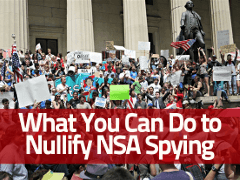 Rosa Parks faced what likely seemed a hopeless situation at the time.
Rosa Parks faced what likely seemed a hopeless situation at the time.
Majority opinion, backed by the strong arm of government, relegated her to second-class citizenship. In that day, who imagined it would ever change?
Parks was riding the Cleveland Avenue bus home from work in Montgomery, Alabama on Dec. 1, 1955, when the white only seats in the front filled with passengers. Bus driver James Blake moved the “colored” section sign behind the row Parks was sitting in and demanded that she move to seats in the rear of the bus to accommodate the white riders.
She said, “No.”
“People always say that I didn’t give up my seat because I was tired, but that isn’t true. I was not tired physically, or no more tired than I usually was at the end of a working day. I was not old, although some people have an image of me as being old then. I was forty-two. No, the only tired I was, was tired of giving in,” she wrote in her autobiography.
Parks’ actions that day sparked the Montgomery bus boycott and ignited the civil rights movement. Ultimately, Jim Crow died because one woman grew tired of giving in and had the guts to say, “No.”
Today, we also face a seemingly hopeless situation with our own government relentlessly spying on us.
No Exceptions
Prior to the Revolution, the British claimed the authority to issue Writs of Assistance allowing officials to enter private homes and businesses to search for evidence of smuggling. These general warrants never expired and were considered a valid substitute for specific search warrants.
With British tyranny fresh on their minds, many state ratifiers insisted on a Bill of Rights to the U.S. Constitution, and among those fundamental rights, the founders included a provision protecting the people from the arbitrary search and seizure.
The right of the people to be secure in their persons, houses, papers, and effects, against unreasonable searches and seizures, shall not be violated, and no Warrants shall issue, but upon probable cause, supported by Oath or affirmation, and particularly describing the place to be searched, and the persons or things to be seized.
Note the Fourth Amendment includes NO exceptions. Not for catching “terrorists.” Not for super secret intelligence agencies. Not to keep us safe.
None.
The unconstitutional seizure of phone records, Internet data, emails and other personal information by the feds represents only the tip of the iceberg. As more information about federal spying comes out, many Americans grow more and more alarmed. But how do we stop a massive, powerful, secretive government organization like the NSA?
We could wait on Congress. But that bunch has had plenty of chances to shut it down. Our representatives and senators keep rubber stamping it. We could rely on the courts. But when was the last time those black-robed federal employees did anything to limit federal power? They rubber stamp it too. Maybe the president will save the day. But the commission Obama formed to review NSA surveillance was packed with government insiders.
More rubber stamps.
Strike the Root
James Madison gave us a blueprint for stopping federal overreach in Federalist 46. Essentially, he said strike the root. Cut off power from the bottom. Madison argued that action at the state and local level could “oppose, in any State, difficulties not to be despised.” He went on to point out that in a large state, these actions would create “serious impediments.” And when several states join together, Madison said it would “present obstructions which the federal government would hardly be willing to encounter.” (You can read more about Madison’s blueprint HERE.)
Northern states successfully followed this blueprint to resist federal fugitive slave acts. Between 1820 and 1860, most northern states passed personal liberty laws to resist these acts that denied due process to any black person accused of escaping slavery. Personal liberty laws included provisions prohibiting state or local officials from cooperating with fugitive slave rendition and denying use of state or local facilities, such as jails. They were so successful, several southern states cited northern noncooperation with the fugitive slave acts in their declaration of causes for secession.
The Way Forward
We can follow in the courageous footsteps of northern abolitionists who fought federally sanctioned kidnapping at the state and local level, and rein in the U.S. surveillance state.
The strategy? Hinder the NSA’s ability to gather information unconstitutionally in the United States by denying them any cooperation from state and local governments, and incentivize others to refuse cooperation as well.
We are developing a comprehensive strategy that will do just that.
As a first step, we’ve drafted model legislation that will accomplish several things.
First, it prohibits any political subdivision in the state from providing material support from any agency collecting information without a warrant describing the person(s), place(s) and thing(s) to be searched or seized. It also denies the use of state resources or state funds for these organizations.
Second, it prohibits any political subdivision in the state from providing services to organizations like the NSA engaging in warrantless spying. This becomes particularly significant when considering a political subdivision of Utah supplies 1.7 million gallons of water to keep the NSA spy grid cool. That would shut off.
Third, it makes any person or business cooperating with unconstitutional spying ineligible to do business with state or local governments. This would give Internet providers and other tech companies economic factors to consider before signing on to turn information over to the NSA.
Fourth, it makes any information obtained through unconstitutional federal spying passed on to state or local law enforcement inadmissible in state courts.
It’s Up to Us
We can’t rely elected officials in Washington D.C. to stop federal spying. We must pressure them from the bottom up, and make it more difficult for the NSA and other federal agencies to operate outside of the law. We must insist they follow the Constitution and respect our civil liberties.
We’ve seen the federal government grow ever more intrusive over the last 50 years. In the name of security, it’s continued to operate with utter disregard for basic civil liberties and constitutional constraint. This isn’t a Republican Party problem or a Democratic Party problem. It’s a structural problem that grew to this level because we let it.
We are tired of giving in. Now’s the time to follow Rosa’s brave example and make it clear we will no longer submit.
It’s up to us.
“It was just time,” Parks said. “There was opportunity for me to take a stand to express the way I felt about being treated in that manner. I had not planned to get arrested. I had plenty to do without having to end up in jail. But when I had to face that decision, I didn’t hesitate to do so because I felt that we had endured that too long. The more we gave in, the more we complied with that kind of treatment, the more oppressive it became.”
TAKE ACTION
If you believe in freedom, liberty, the 4th Amendment – you cannot sit idly by. Take action today to push back and create roadblocks.
1. Learn about the NSA’s very real achilles heel here:
https://nullifynsa.com
2. Get the model state legislation and local resolution to oppose the NSA
3. Hit the TAKE ACTION links at the #NullifyNSA site to find out where you can address and exploit these weaknesses:
STATE
LOCAL
CAMPUS
CORPORATIONS
4. Get Flyers to help spread the word!
Here: https://nullifynsa.com/product/flyers-4th-amendment-protection-act/
- 1761: When American Independence was Born - February 13, 2026
- Writs, Riots, and Redcoats: Hancock’s Spark of the Revolution - January 17, 2026
- The National Bank That Breached the Articles of Confederation - June 2, 2025

